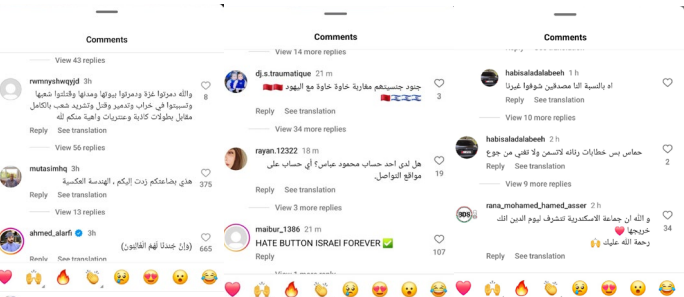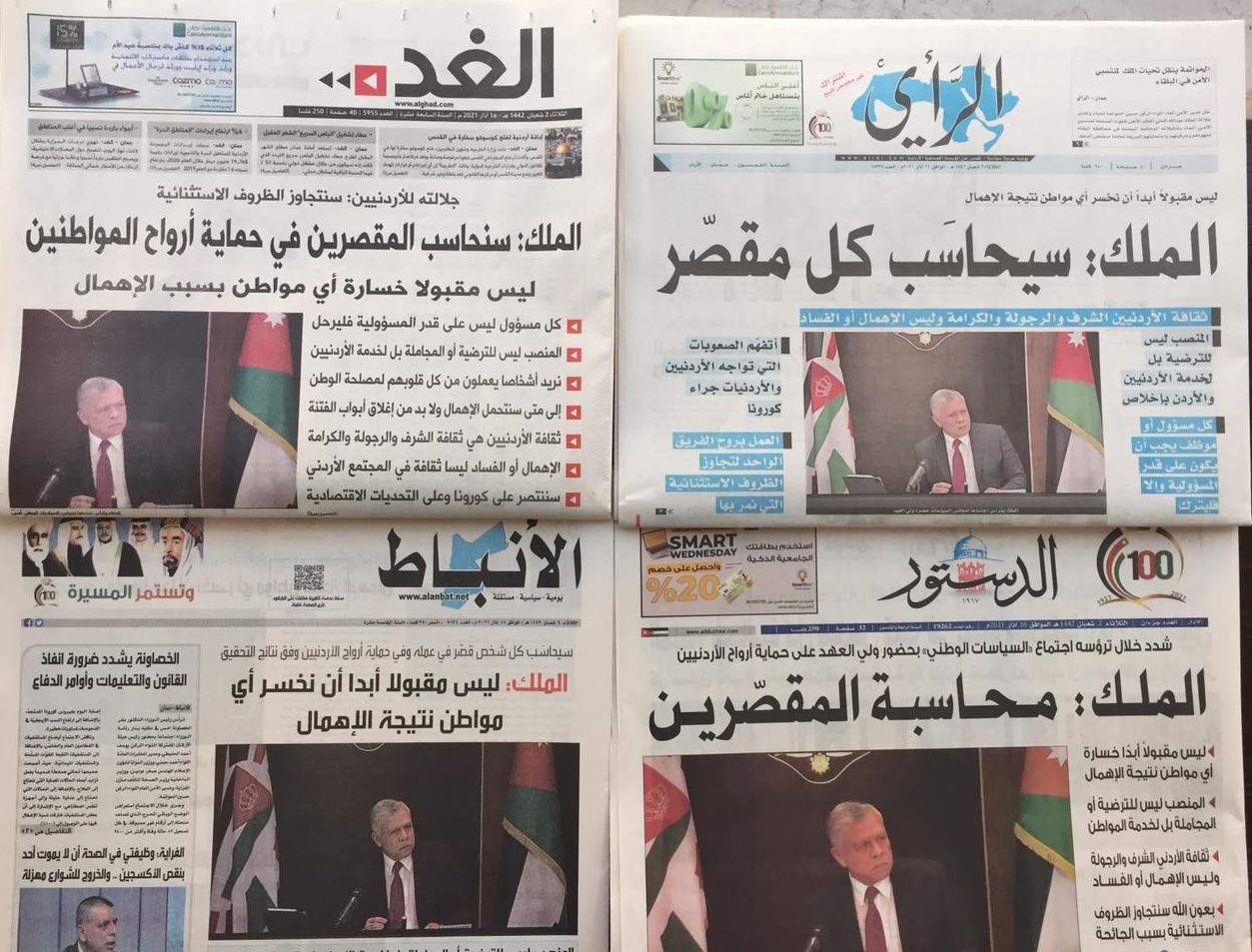Israel has launched a digital war against Palestinians by flooding social media with fake accounts designed to spread disinformation, distort narratives, and demonize Palestinian resistance. These accounts, often impersonating Arabs and mimicking regional dialects, aim to create fake public opinion, promote division among Arab nations, and advance the Israeli agenda in the digital space.
“From Morocco, I stand with Israel.”
“I am from Mosul, and I say that Hamas is the reason for the destruction of Gaza and Palestine.”
“Palestinians deserve the war and destruction they are facing.”
“Beggars for aid who don’t appreciate the generosity of Gulf countries.”
These are just a small sample of the negative and hostile comments about Palestinians that can be found almost daily on popular Arab digital news platforms. But are these comments genuinely from real individuals and accounts, or are they fabricated to serve specific agendas?
In truth, this is another war waged by Israel against Palestinians in the digital space. It involves flooding social media platforms with hundreds of fake accounts to spread false and misleading information aimed at promoting the Israeli narrative while demonizing Palestinian resistance and Palestinians in general. This cyber warfare coincided with the intense media campaign launched by Israel—government officials and Hebrew media outlets—in response to the Al-Aqsa Flood operation on October 7, 2023. The goal was to mislead global public opinion and distort the truth about what occurred on the ground.
The most prominent aspect of this media war was the quick dissemination of accusations against Palestinian resistance fighters, alleging that they had killed 40 Israeli children, beheaded them, and assaulted women in settlements around Gaza during the early hours of the operation launched by Al-Qassam Brigades, Hamas’s military wing, against Israel.
We also recall how the leaders of several countries and Western media outlets were quick to adopt these claims and systematically repeat them without verifying their authenticity.
Suspicious Accounts
As a journalist and researcher specializing in media and digital diplomacy during times of conflict and war, I was struck by the sudden and unusual emergence of dozens of fake accounts on digital platforms at the start of the war on Gaza in October 2023. This suspicious activity led me to track around 50 accounts on Instagram alone in an effort to understand their nature and identify who was truly behind them. Here are the key findings:
-
Newly Created Accounts
Most of these accounts were created within a short time after the war began. Their follower count typically ranged from 50 to 100 at best, with some accounts having no followers at all. -
Impersonation of Digital Characteristics
A significant number of these accounts impersonated individuals from specific Arab countries, posting in broken Arabic while attempting to mimic dialects like Egyptian, Moroccan, or Gulf Arabic. Many of these accounts displayed the flag of a specific Arab country alongside the Israeli flag. Others included profile descriptions falsely claiming an Arab identity, such as “A Kuwaiti who loves Jordan” or “A Gulf Arab who loves Islam and Arabism.” Some even quoted poetry, hadiths, or Quranic verses in a deliberate attempt to mislead and obscure the true nature of these accounts.A significant number of these accounts impersonated individuals from specific Arab countries, posting in broken Arabic while attempting to mimic dialects like Egyptian, Moroccan, or Gulf Arabic. - Organized Activity
I observed that these targeted accounts consistently follow major Arab platforms such as Al Jazeera, Al Jazeera Mubasher, TRT Arabic, and Sky News Arabia with notable intensity and focus. Barely a news story or video related to the war is published before these accounts simultaneously rush to comment.
Based on this, I reached the following conclusion:
- If the post pertains to Israeli crimes in Gaza, such as the killing of civilians, children, and women, or the destruction of buildings, these accounts predominantly attack Palestinian resistance and Iran, blaming them for causing the war and the devastation in Gaza.
- However, if the post conveys positive messages like resilience, steadfastness, or support for the resistance, these accounts are conspicuously absent from the comments.
- Repetition of the Same Narrative
A significant number of these accounts repeatedly post the same comments they initially shared at the start of the war. Additionally, identical comments are used across multiple digital platforms to create the illusion of public consensus. This suggests that these fake accounts are managed by organized electronic teams, deliberately orchestrating these activities. -
Sowing Discord Among Arabs
A closer examination of comments posted by these accounts reveals a deliberate effort to incite division among Arab populations, especially those with historically contentious political relationships, such as Morocco and Algeria or Kuwait and Iraq. Here are some striking examples of repeated comments:
- “From Algeria, we confirm that Moroccans are traitors who normalized ties with Israel.”
- I’m Kuwaiti, and I’m against Shiite Iraq and Majusi Iran.” -
Creating Fake Dialogues
These accounts actively support one another and attempt to engage Arab users in fabricated discussions. For example, Account A might post an offensive comment against Hamas, which Account B immediately agrees with. Account A would then follow up, encouraging real Arab users to participate in a dialogue unwittingly initiated by fake accounts. This increases the visibility of these accounts and lends them unwarranted significance.
-
Frequent Changes and Disappearances
Many of these accounts change their usernames and profile details repeatedly within a short period, and some have disappeared entirely.
A significant number of these accounts repeatedly post the same comments they initially shared at the start of the war. Additionally, identical comments are used across multiple digital platforms to create the illusion of public consensus.
Is This an Organized Cyber Army?
The proliferation of fake accounts in the digital space during the war on Gaza raises a critical question: who is behind them? It seems clear that these accounts do not operate individually but are part of an organized and calculated effort to fabricate a false public opinion suggesting support among some Arabs for Israel.
This brings us to the Israeli Hasbara program, a Hebrew term meaning "explanation." In practice, however, it refers to propaganda and disinformation campaigns. The term was first coined in the early 20th century by Zionist activist Nahum Sokolow and was later used as a synonym for public relations. In reality, though, it represents a highly organized program to spread Israeli political propaganda worldwide, backed by significant government and security resources.
It seems clear that these accounts do not operate individually but are part of an organized and calculated effort to fabricate a false public opinion suggesting support among some Arabs for Israel.
Hasbara efforts often target Western political elites, opinion leaders, and the general public. These campaigns involve almost every Israeli governmental institution, including the military, the Ministry of Foreign Affairs, NGOs, universities, research centers, advocacy groups, and even student organizations. The aim is to manipulate narratives, shape global perceptions, and garner support for Israel by systematically spreading misinformation and promoting its political agenda.
Recently, a private Israeli online watchdog called FakeReporter revealed active Israeli influence across digital platforms, employing hundreds of fake accounts among Western audiences in English to promote the Israeli narrative, particularly targeting UNRWA and Hamas. This digital activity involved amplifying claims and allegations about UN agency employees' involvement in the October 7 attack. It is evident that this campaign contributed, in one way or another, to deceiving several Western countries, some of which suspended their financial support for the agency before later reversing their decisions.
Between the Mossad and “Pallywood”
Cyber warfare is not limited to fake accounts but also includes accounts claiming to be affiliated with official and security entities in Israel, which contribute to spreading news and misinformation to the public. Journalist Shayan Sardarizadeh, a specialist in online misinformation at the BBC, was among the first to uncover one of the accounts claiming to belong to the Israeli intelligence service (the Mossad) on the X platform. It was later revealed that the account, which carried a blue verification badge and had more than 100,000 followers, was not authentic after Shayan analyzed videos published on the account and proved they were fake.
On the other hand, the war revived the use of the term “Pallywood,” a blend of the words “Palestine” and “Hollywood,” which Israel has used for years to discredit the Palestinian narrative by claiming that Palestinians are liars who theatrically portray their suffering. This hashtag spread widely during the war with misleading images and out-of-context videos accusing Palestinians of faking their extermination in Gaza. The intensive use of the term “Pallywood” undoubtedly aims to strip Palestinians of their humanity and distort their image before global public opinion.
For example, the misinformation campaign targeted the activist from Gaza, Saleh Al-Ja’frawi, who angered Israel due to his digital platform activity. A wide-scale campaign accused him of lying, deceiving, and acting, branding him as “Hamas’s Pallywood Actor.” Later, a completely different narrative emerged, accusing him of collaboration with Israel. A fake account tweeted:
- “It can now be revealed that Al-Ja’frawi was an Israeli informant who provided valuable intelligence to Israel,”
- and added, “Thank you, Shalev Yarev (the secret name for Saleh Al-Ja’frawi), for your service to Israel.”
There are specific indicators for determining the authenticity of social media accounts, including the creation of a new profile and the sharing of a large amount of controversial and contradictory content within a relatively short period. The presence of such signs strongly suggests that the account is likely fake or managed by individuals or entities for security purposes. This applies to dozens of accounts I monitored during the current Israeli war on Gaza. I found that some newly created accounts share completely unrelated videos at a rapid pace, such as posting Islamic religious clips and then sharing Israeli songs or content supporting the occupation. Some accounts post videos of Israeli crimes in Gaza alongside videos showing support for Israel. How can two contradictory narratives coexist on an account claiming an Arab identity?
In conclusion, I would like to point out that some of the accounts I tracked sent me follow requests on Instagram, which made me almost certain that these accounts are not only fake but also operate as part of a coordinated team and plan for specific purposes.

This article was originally written in Arabic and has been translated into English with the assistance of AI tools and edited to ensure clarity and accuracy









































